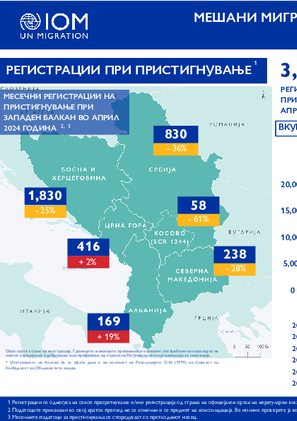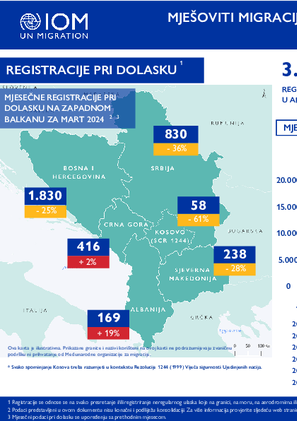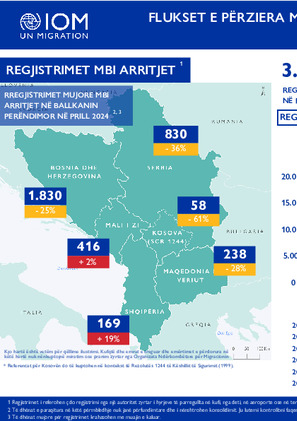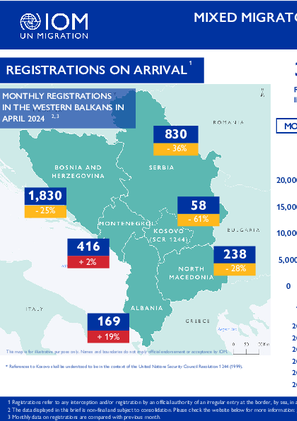-
Countries
-
Data and Analysis
-
Special Focus
-
Crisis Responses
Месечен преглед на:
- Пристигнувања во Западен Балкан
- Топ три националности на лица кои пристигнале во месецот на известување
- Присуство на мигранти во прифатните објекти
- Доброволно асистирано враќање и реинтеграција
Mjesečni pregled:
- Dolasci na Zapadni Balkan
- Tri najzastupljenije nacionalnosti u izvještajnom mjesecu
- Prisustvo migranata u prihvatnim centrima
- Potpomognuti dobrovoljni povratak i reintegracija
Përmbledhje mujore të:
- Arritjet në Ballkanin Perëndimor
- Tre kombësitë kryesore të arriturëve
- Prania e migrantëve në qendrat pritëse
- Kthimet vullnetare dhe të asistuara
Monthly Overview of:
- Arrivals in the Western Balkans
- Top three nationalities at arrivals in the reporting month
- Migrants presence in reception facilities
- Assisted Voluntary Returns and reintegration
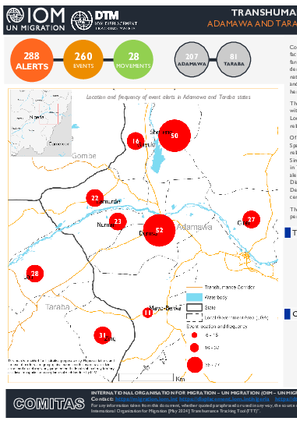
Contact
DTM Nigeria, iomnigeriadtm@iom.int
Language
English
Location
Nigeria
Period Covered
Apr 01 2024
Apr 30 2024
Activity
- Other
Conflicts between farmers and herders in North-East Nigeria and other Sahel regions are rooted in many factors such as desertification, climate change impacts, low rainfall, and competition over suitable land for farming and transhumance activities. These issues are exacerbated by rapid population growth, which drives demand for food, shelter, and security for both humans and livestock. Consequently, competition for scarce natural resources intensifies, leading to incidents like farming on cattle routes, crop destruction, farm damage, and water pollution among others, which often escalate into violent confrontations between the farmer and herder communities.
The Transhumance Tracking Tool (TTT) as a component of the IOM's Displacement Tracking Matrix (DTM), with the support of community key informants, operationalized the Early Warning System in the selected 9 Local Government Area (LGA) in the adjoining states of Adamawa and Taraba to collect alerts that are related to farmer-herder conflicts.
Of the 288 alerts recorded in April, 260 (90%) are event-related while 28 (10%) are related to movements. Specifically, Demsa, Girei, Lamurde, Numan and Shelleng LGAs in Adamawa state reported solely event-related alerts, while in Guyuk LGA, 89 per cent were event-related and 11 per cent were movement-related. Similarly, Mayo-belwa LGA reported 73 per cent event-related alerts and 27 per cent movement-related. Also in Taraba state, Lau LGA reported 74 per cent of event-related alerts and 26 per cent are movement-related alerts while Zing LGA reported 72 per cent of movement-related alerts and 28 per cent are event-related. Disaggregated ward-level data indicates that Kodompti, Talum and Demsa wards in Numan, Shelleng and Demsa LGAs of Adamawa state reported the highest percentage of events, cumulatively encompassing 20 per cent of the total alerts.
The event alerts reported across all LGAs suggested a population displacement rate of 2 per cent, with 17 per cent of instances of alerts resulting in casualties or injuries.
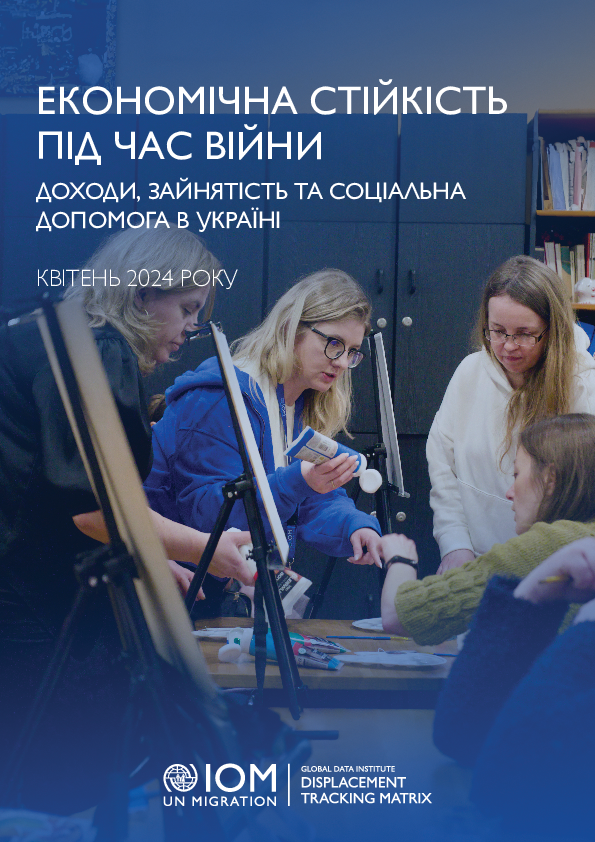
Contact
DTM Ukraine, dtmukraine@iom.int
Language
English
Location
Ukraine
Snapshot Date
Apr 30 2024
Activity
- Other
Після повномасштабного вторгнення в Україну в лютому 2022 року країна зіткнулася з глибокими економічними потрясіннями та масовим переміщенням населення. Мільйони людей прагнуть безпеки та стабільності, тому проблеми збереження засобів до існування, забезпечення зайнятості та доступу до соціального захисту є першочерговими, що вимагає цілеспрямованих заходів для пом'якшення економічних труднощів.
У цьому звіті розглядаються економічні наслідки війни в Україні, зокрема зміни в рівнях доходів, тенденції зайнятості та заходи соціальної допомоги. Спираючись на дані Опитування загального населення МОМ, цей звіт має на меті сприяти розробці програм на основі фактичних даних, формуванню політики, адвокації та подальшим дослідженням на цю тему.
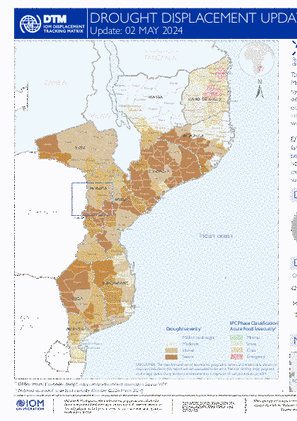
Contact
DTM Mozambique, DTMMozambique@iom.int
Language
English
Location
Mozambique
Period Covered
Apr 22 2024
Apr 24 2024
Activity
- Other
- Mobility Tracking
- Site Assessment
- Event Tracking
The Displacement Tracking Matrix (DTM), in collaboration with Mozambique’s National Institute for Disaster Management (INGD), conducted assessments in Maringue, Chemba, and Barue to record displacements caused by severe El Niño induced drought conditions. Mozambique's National Meteorological Institute (INAM) project decreased precipitation levels and drought conditions across districts in Central and Southern Mozambique - potentially impacting over 20 million people. El- Niño induced drought, land degradation and increased salinity in important water sources continue to place a strain on the agriculture, livestock herding and fishing industries, with many families unable to guarantee sufficient and sustainable livelihoods in rural areas.
DTM’s tracking of climate-induced displacement aims to provide data on the number and location of vulnerable families forced into displacement due to climatic and environmental factors. Joint assessments conducted between 22-24 April estimate 342 individuals (58 families) displaced from Northern Sofala and Tete districts to host communities of Manica (Barue district). Priority needs identified by IDPs include food security, access to clean water, adequate shelter, and agricultural inputs. Additionally, there is a pressing demand for non-food items such as hygiene kits, blankets, mosquito nets, and kitchen sets.
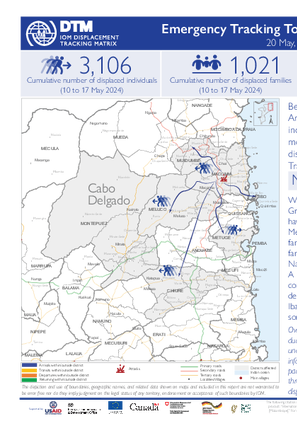
Contact
DTMMozambique@iom.int
Language
English
Location
Mozambique
Period Covered
May 10 2024
May 17 2024
Activity
- Mobility Tracking
- Event Tracking
Between 10 to 17 May 2024, attacks, and fear of attacks by Non-state Armed Groups in Macomia triggered the cumulative displacement of 3,106 individuals/ 1,021 families. The current Movement Alert #113 reports on most recent attacks in Northen Cabo Delgado. For more information on displacements between January and April, please see {Emergency Tracking Online Dashboard}.
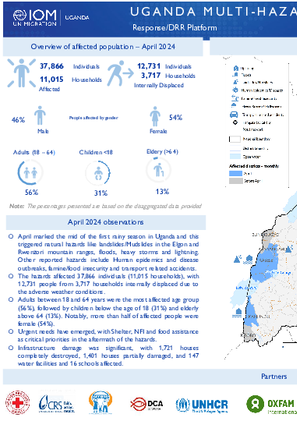
Contact
DTM Uganda, dtmuganda@iom.int
Language
English
Location
Uganda
Period Covered
Apr 01 2024
Apr 30 2024
Activity
- Mobility Tracking
- April marked the mid of the first rainy season in Uganda and this triggered natural hazards like landslides/Mudslides in the Elgon and Rwenzori mountain ranges, floods, heavy storms and lightning. Other reported hazards include Human epidemics and disease outbreaks, famine/food insecurity and transport related accidents.
- The hazards affected 37,866 individuals (11,015 households), with 12,731 people from 3,717 households internally displaced due to the adverse weather conditions.
- Adults between 18 and 64 years were the most affected age group (56%), followed by children below the age of 18 (31%) and elderly above 64 (13%). Notably, more than half of affected people were female (54%).
- Urgent needs have emerged, with Shelter, NFI and food assistance as critical priorities in the aftermath of the hazards.
- Infrastructure damage was significant, with 1,721 houses completely destroyed, 1,401 houses partially damaged, and 147
water facilities and 16 schools affected.
Contact
dtmuganda@iom.int vwabwire@iom.in
Location
Uganda
Activity
- Mobility Tracking
- Baseline Assessment
Period Covered
Apr 01 2024 -May 03 2024
In April 2024, the hazards affected 37,866 individuals (11,015 households), with 12,731 people from 3,717 households internally displaced due to the adverse weather conditions..
A more detailed version of this dataset, including the number of the vulnerabilities, is available. To get access, kindly click on the 'Request Access' button.
Population Groups
IDPs
Residents
Survey Methodology
Unit of Analysis Or Observation
Admin Area 2
Admin Area 3
Community
Type of Survey or Assessment
Key Informant
Keywords
Geographical Scope Full Coverage
Administrative boundaries with available data
The current dataset covers the following administrative boundaries
